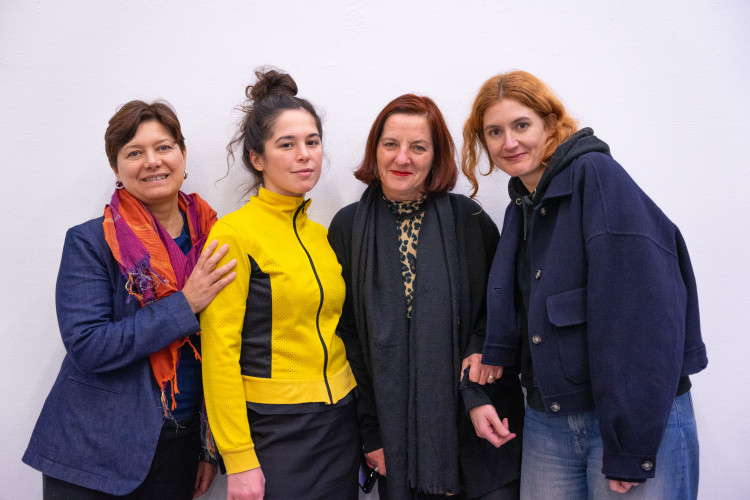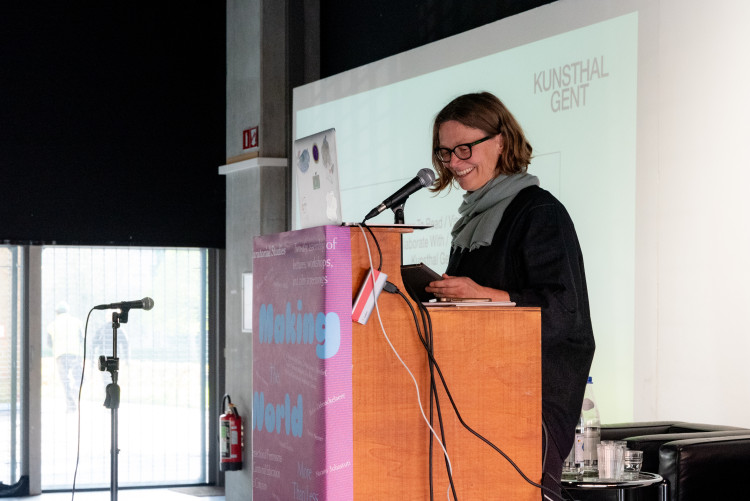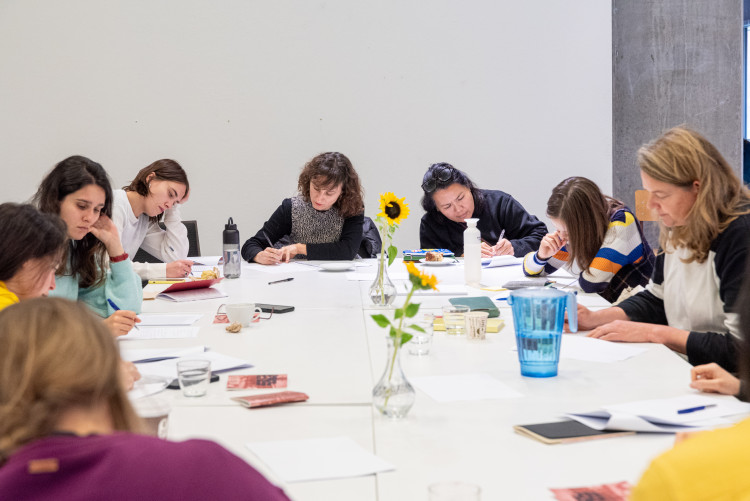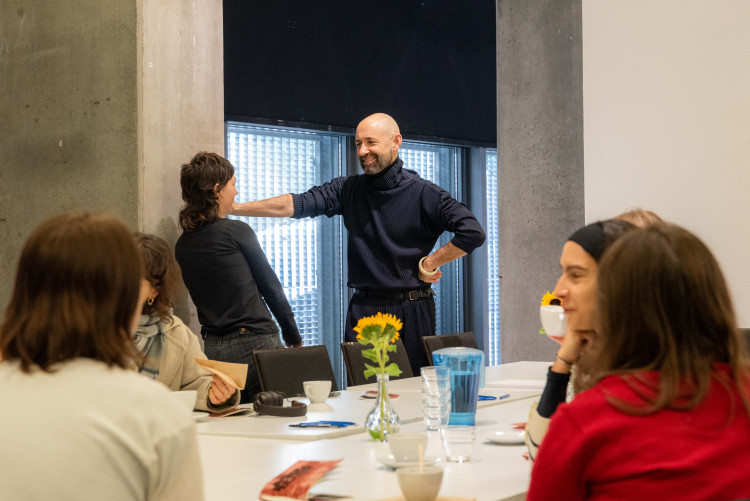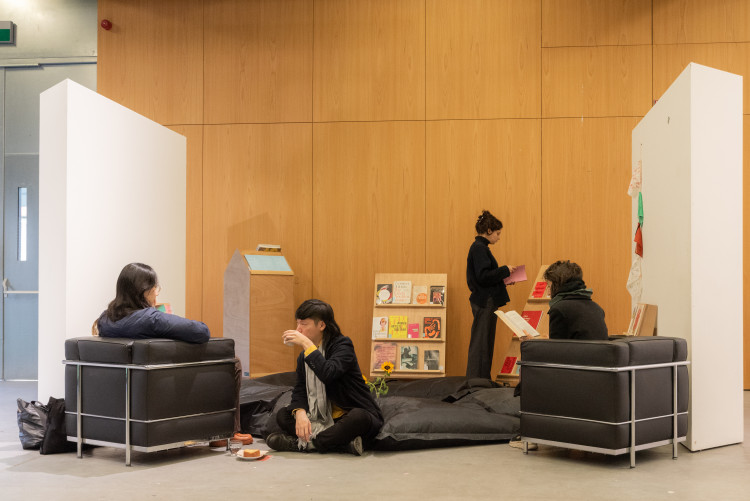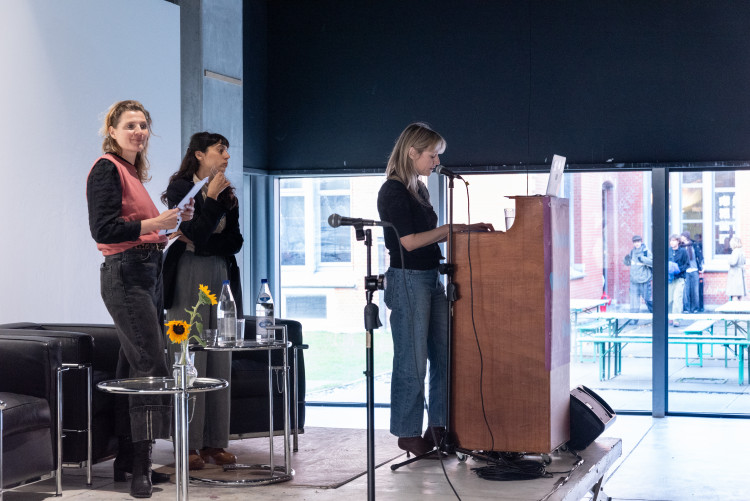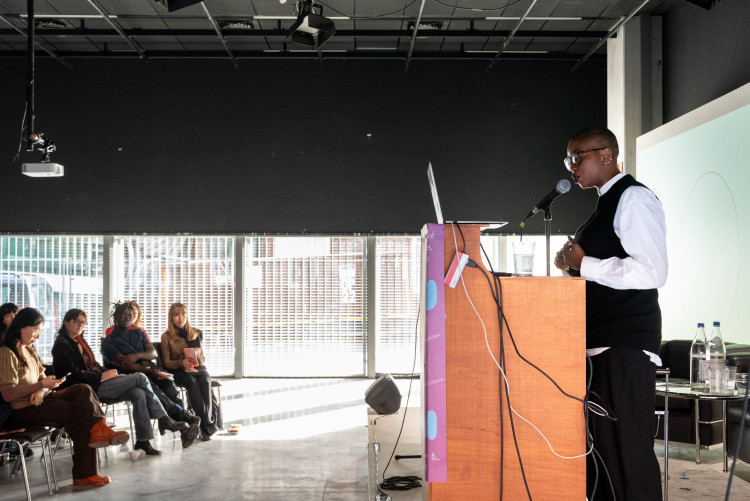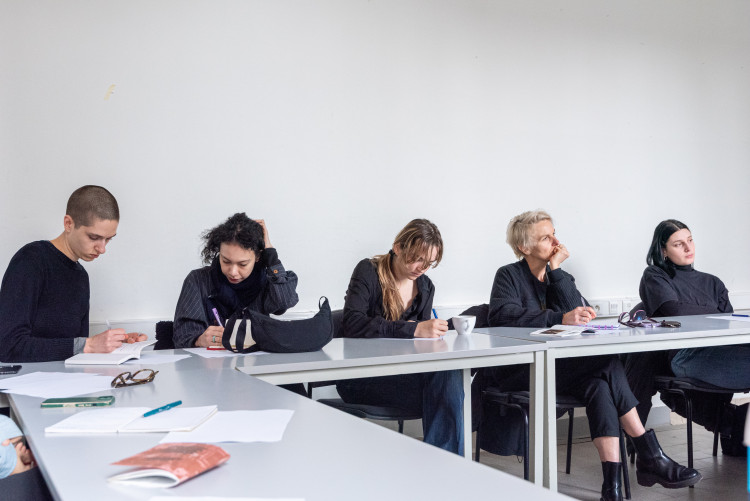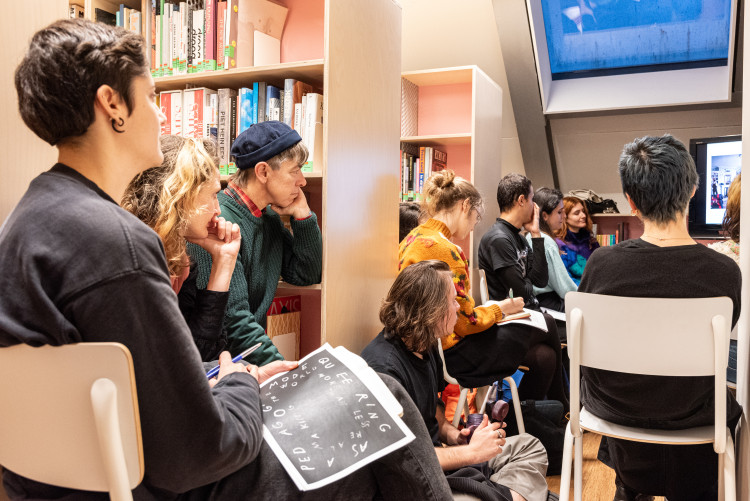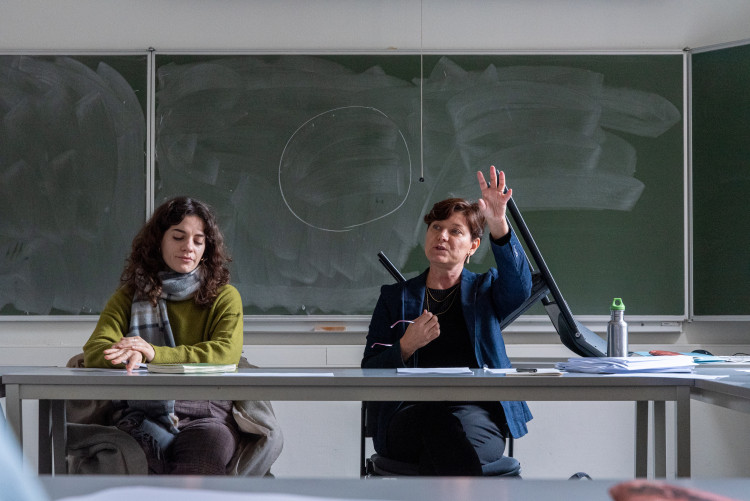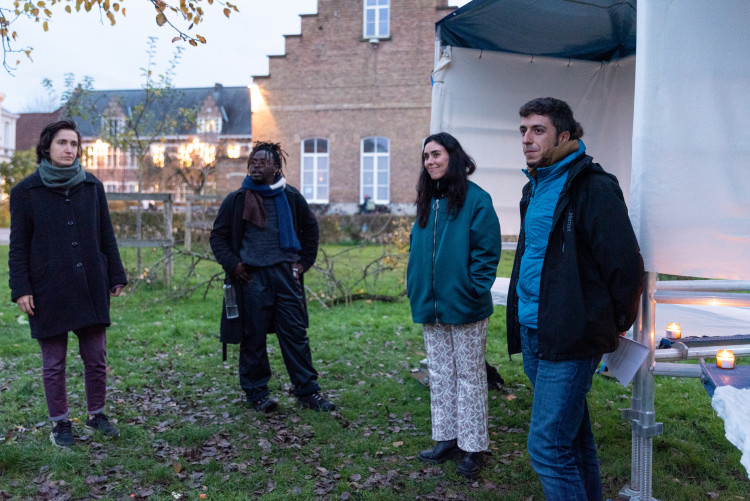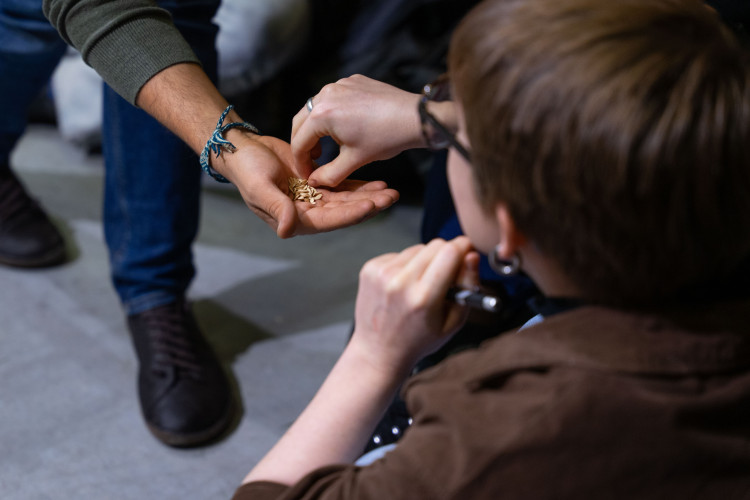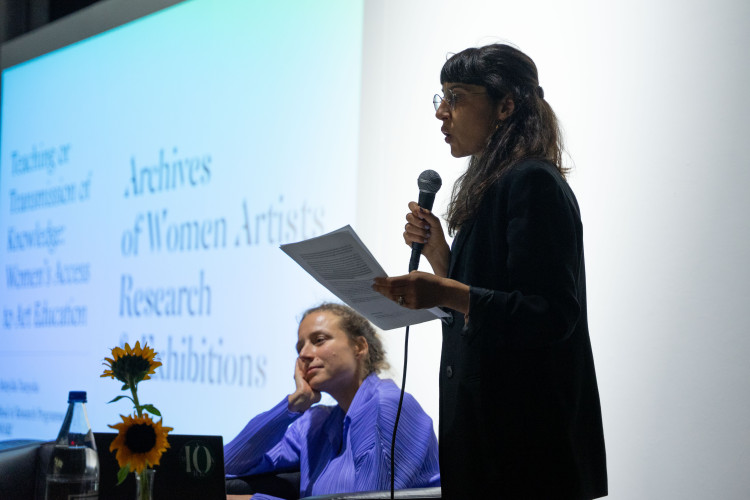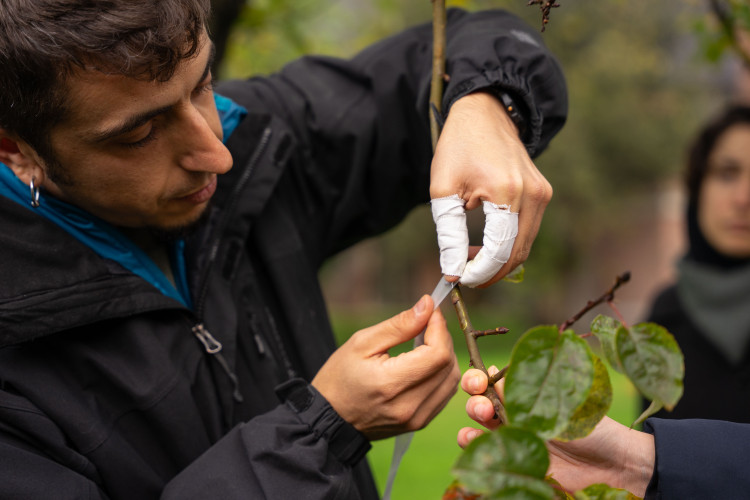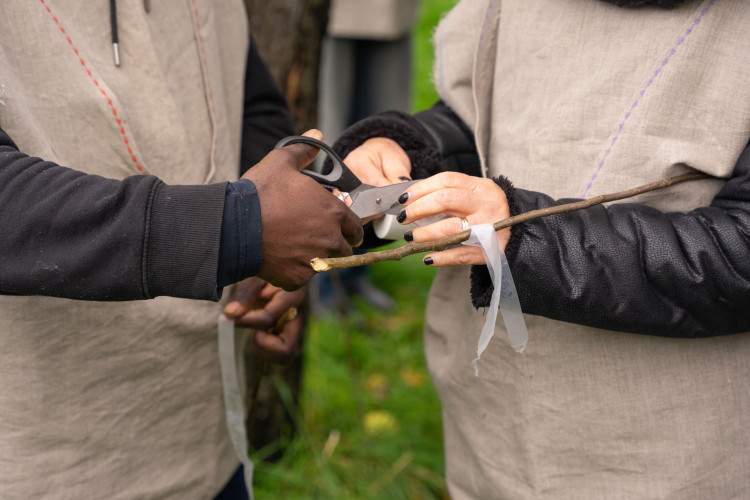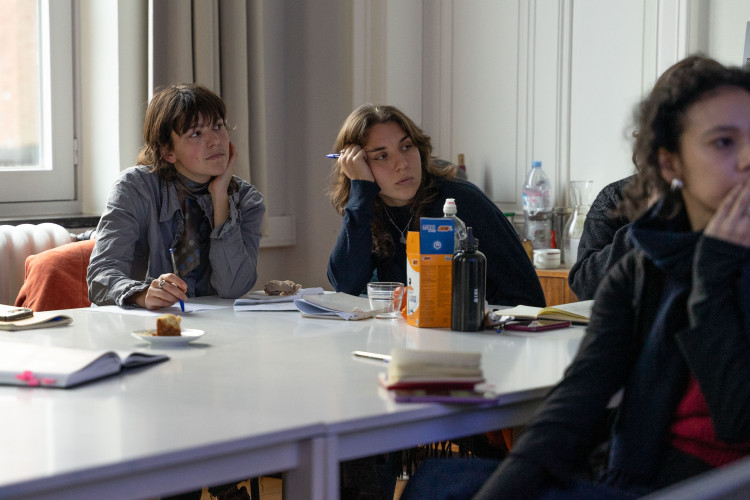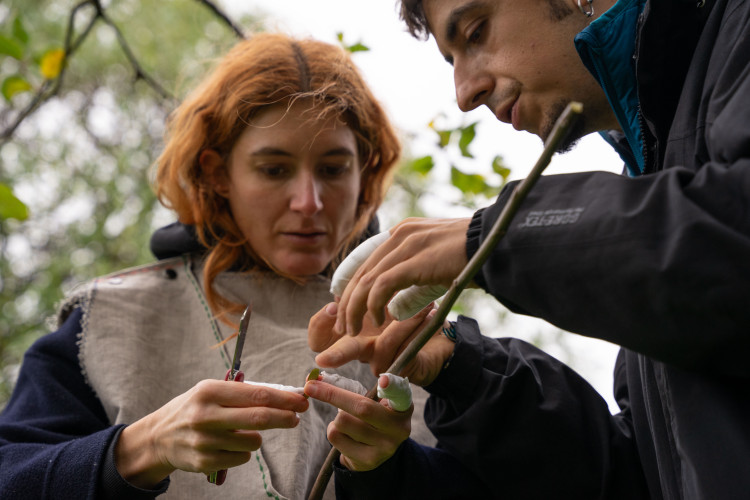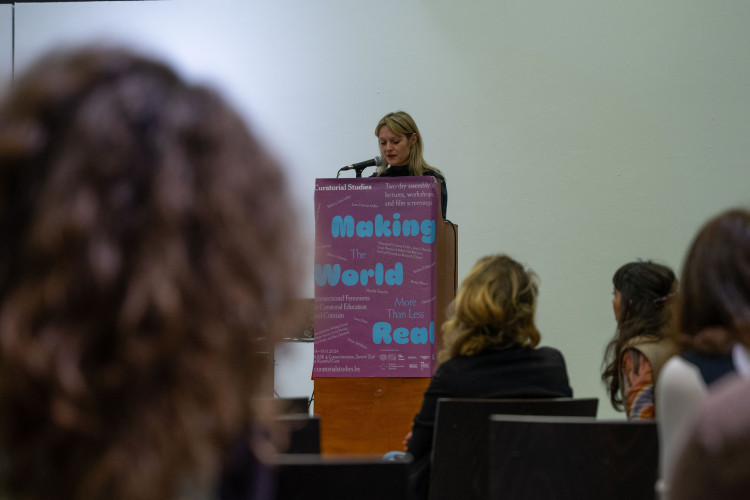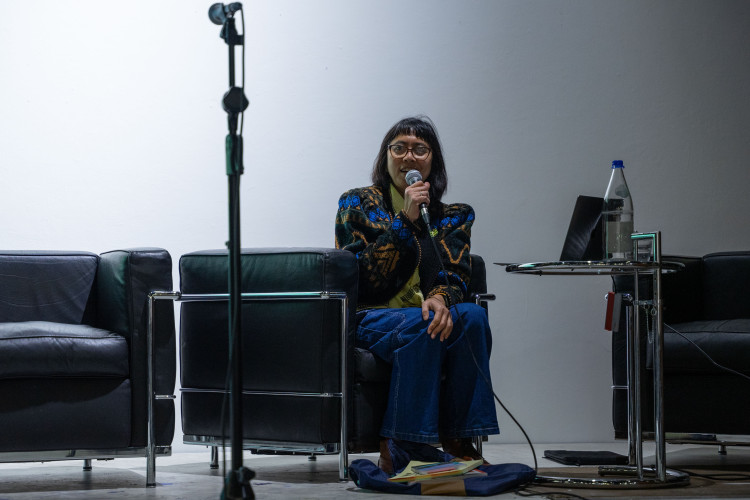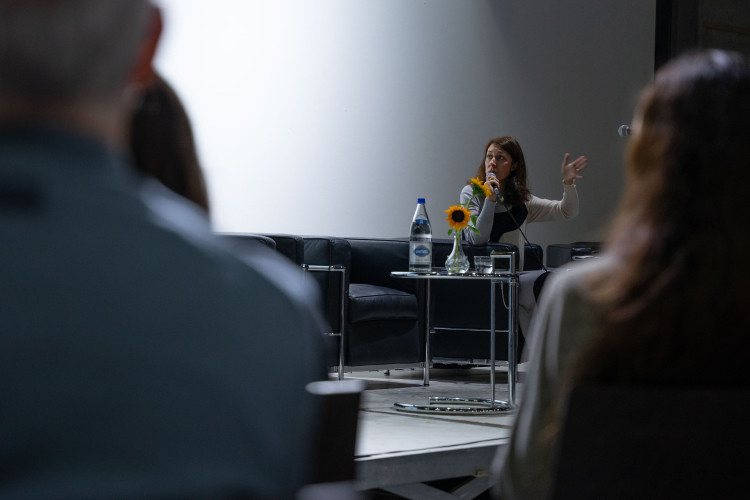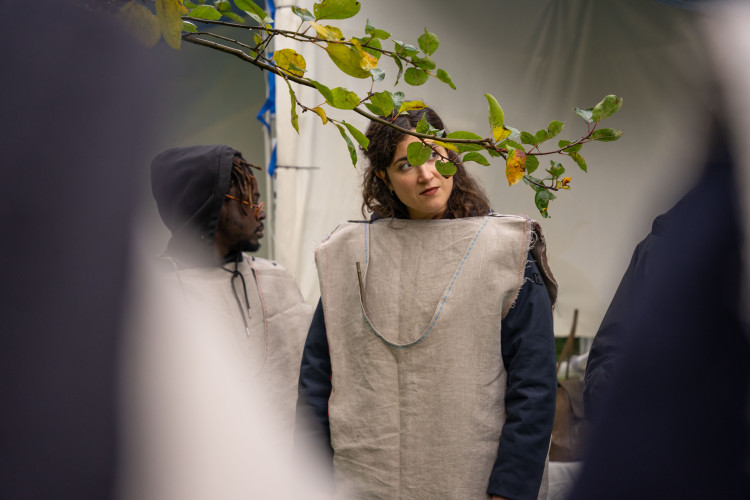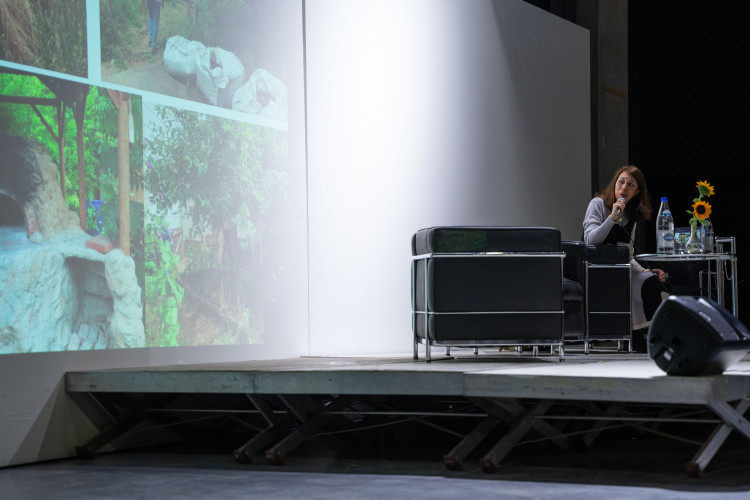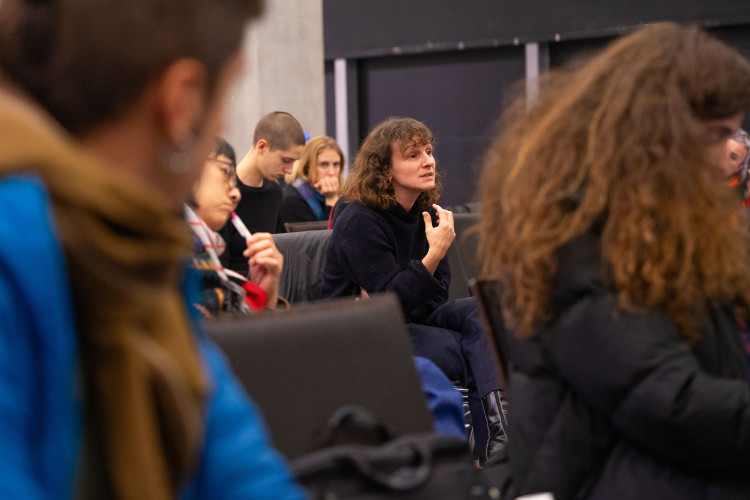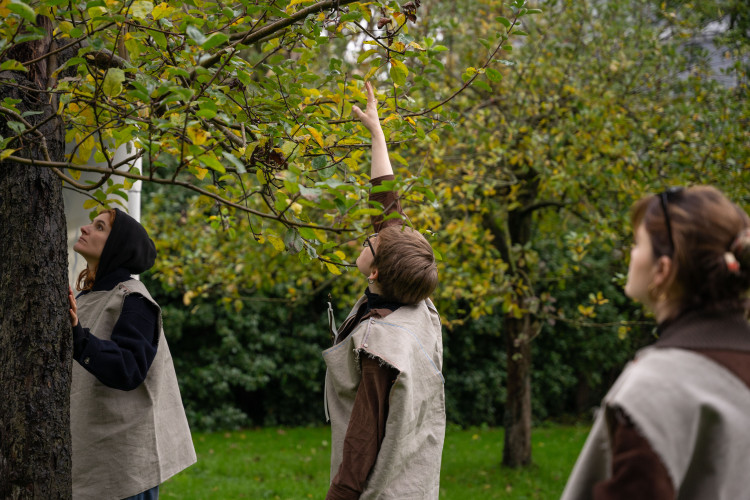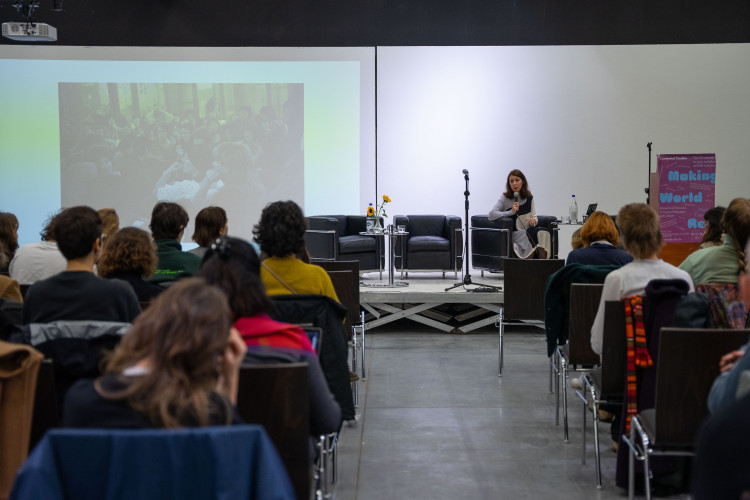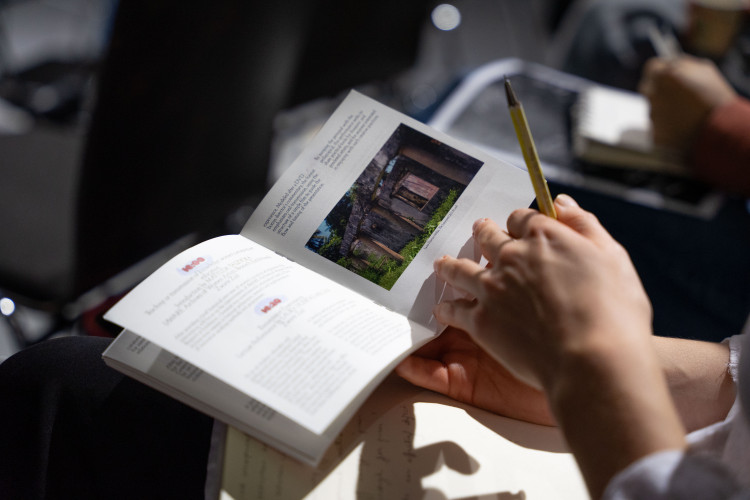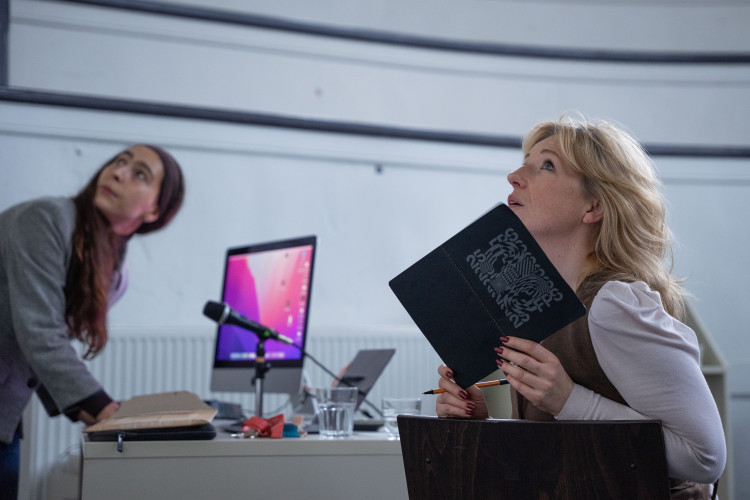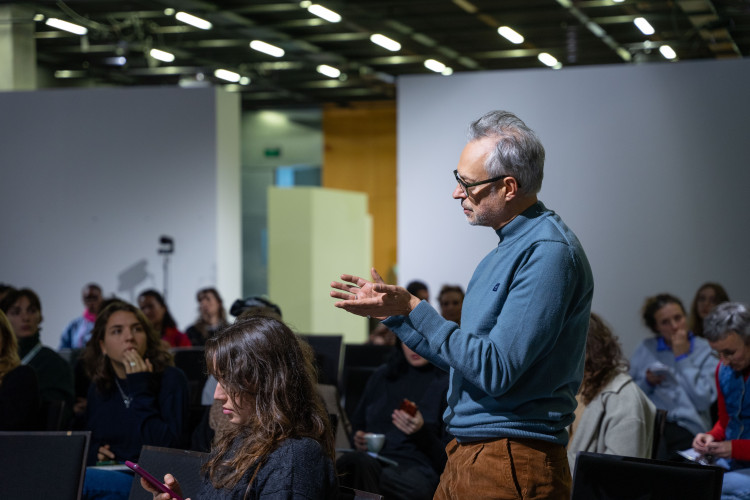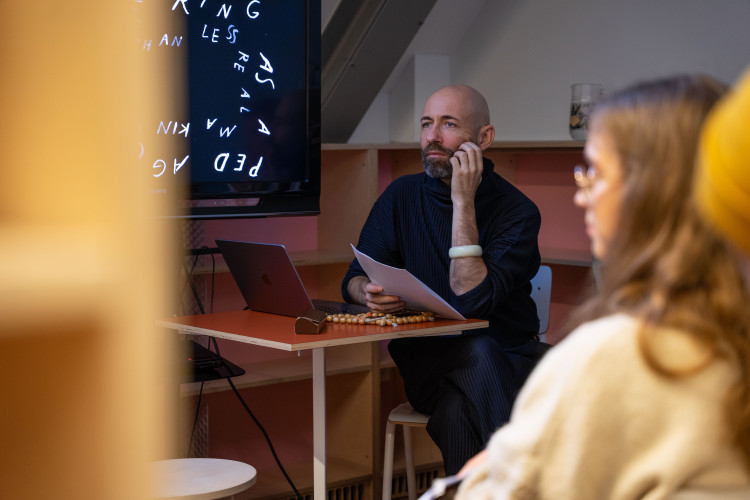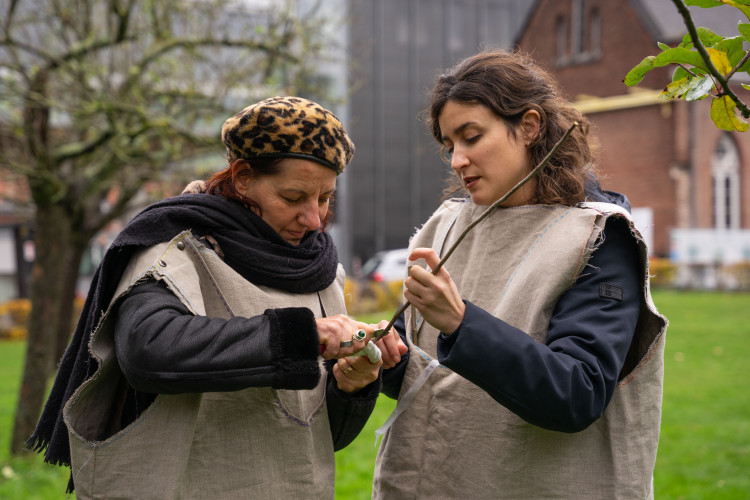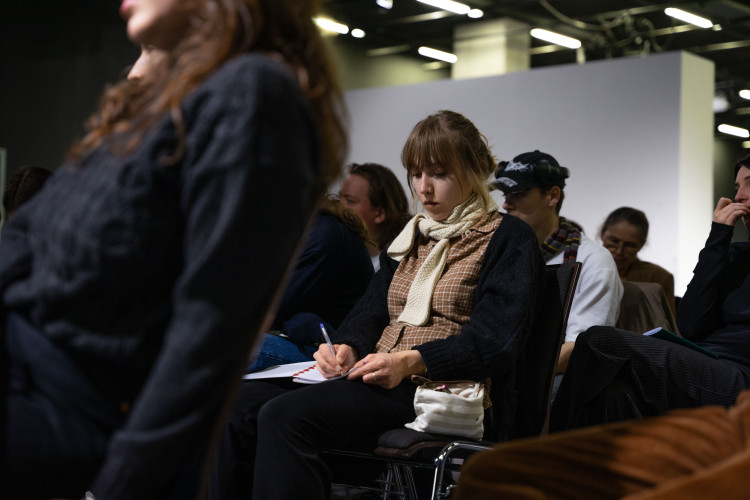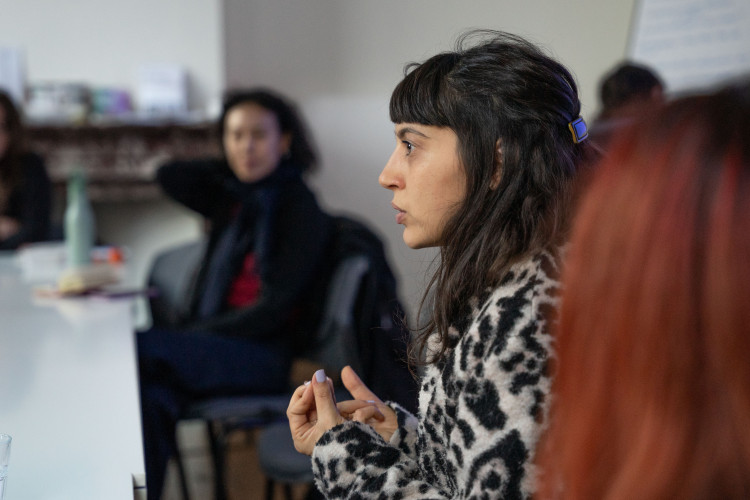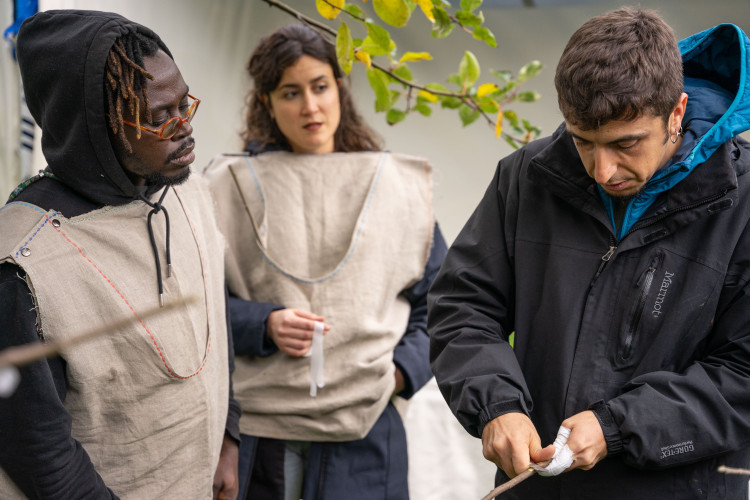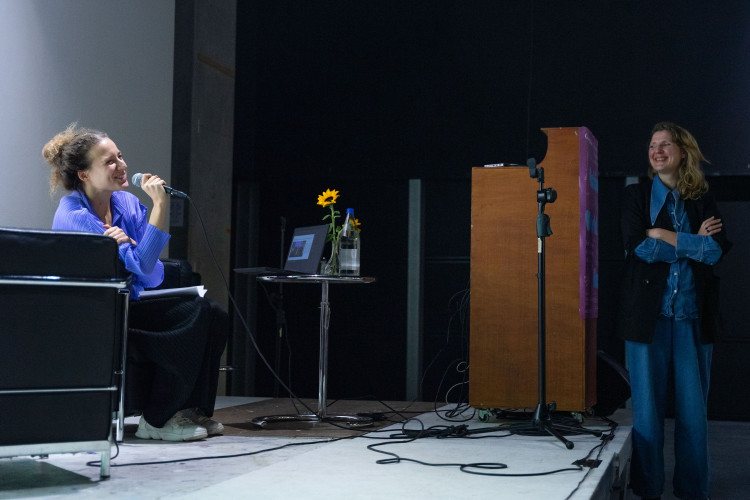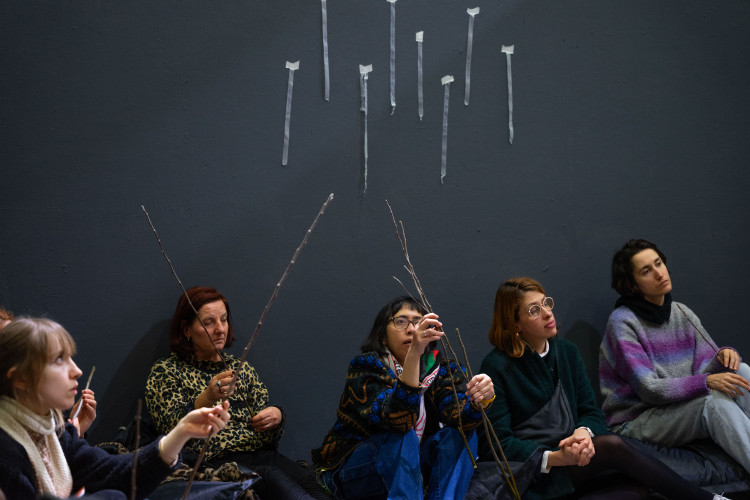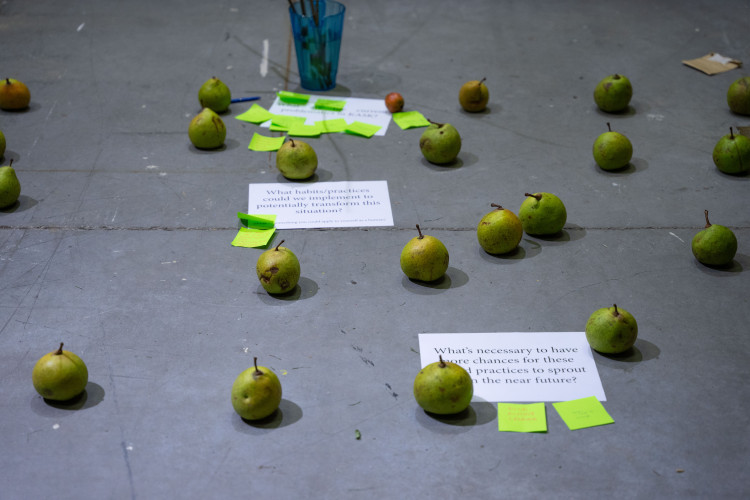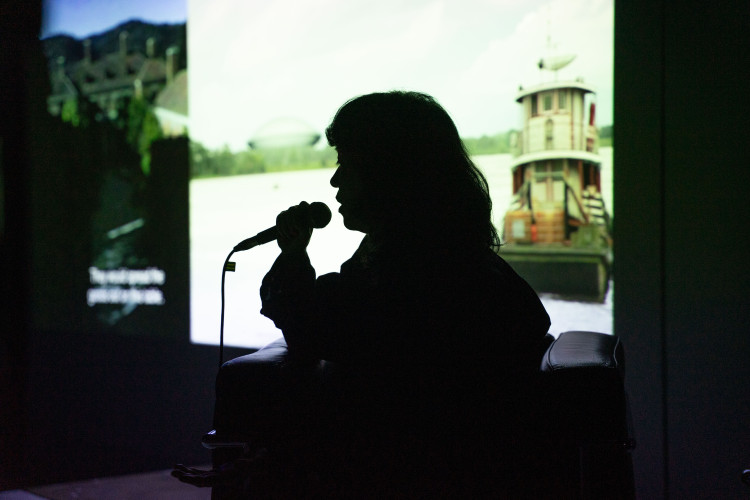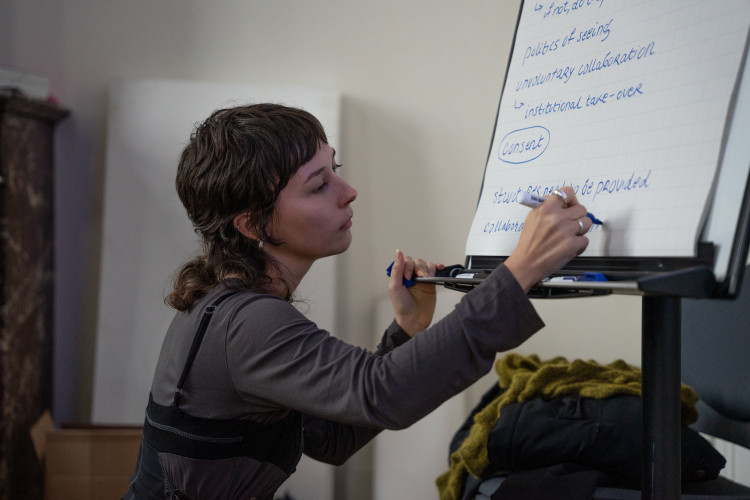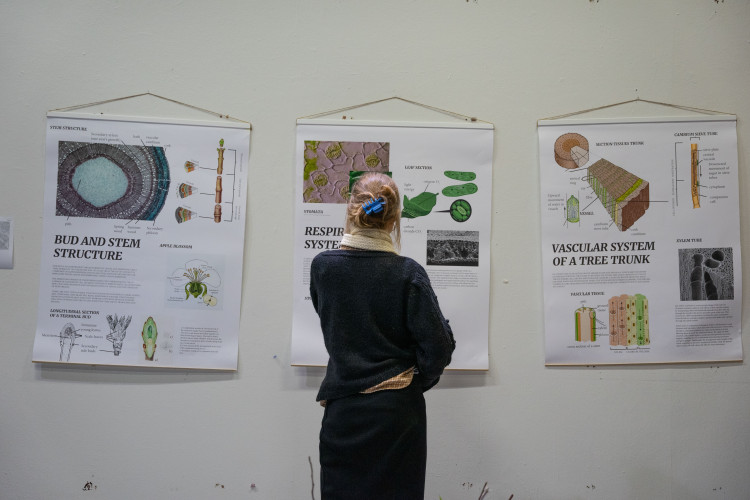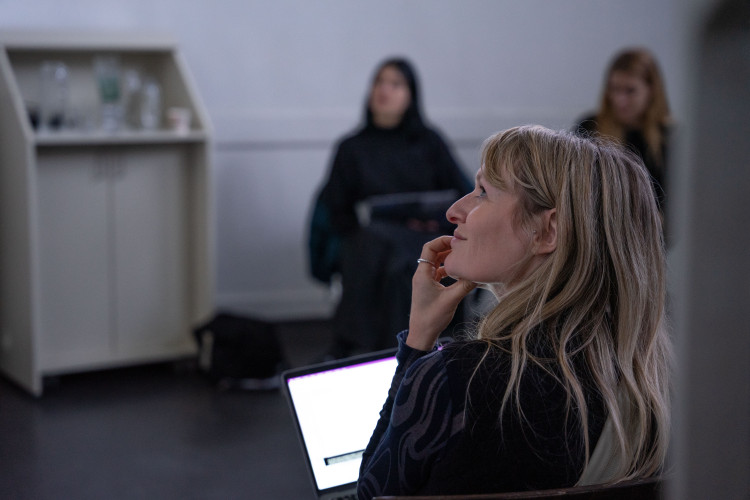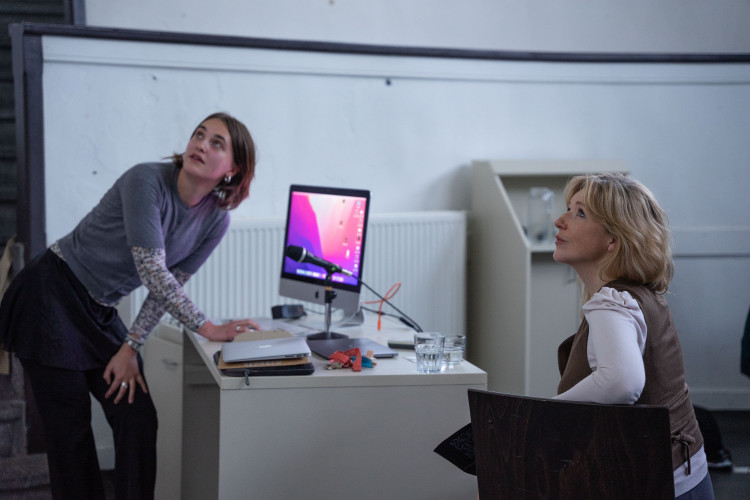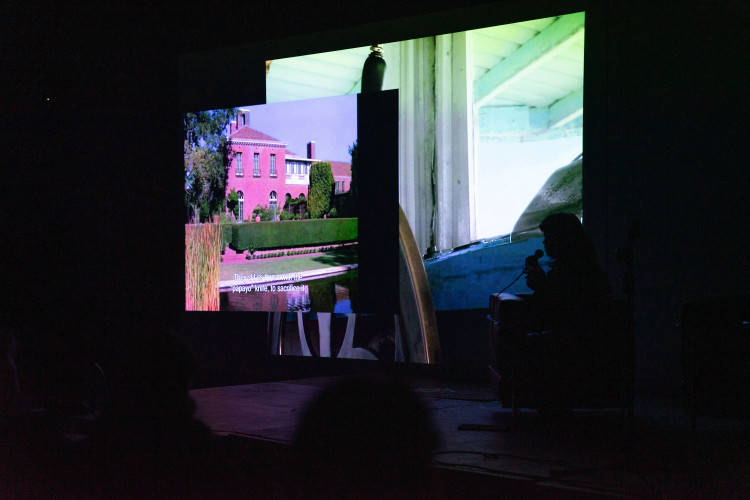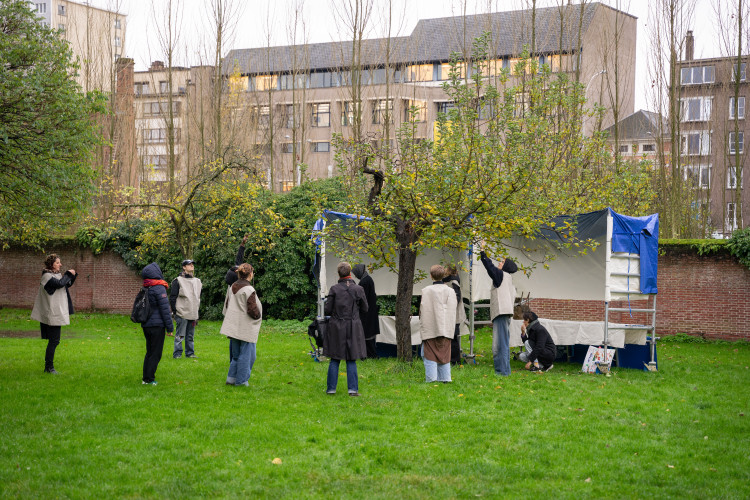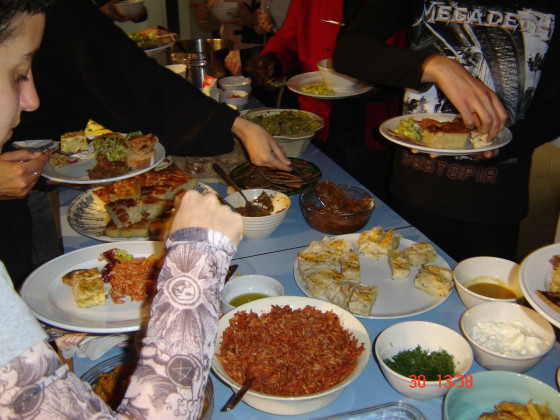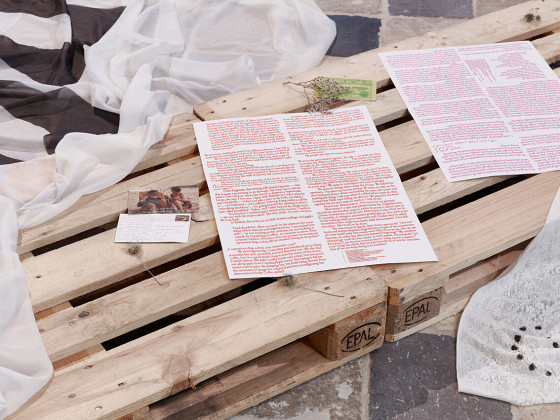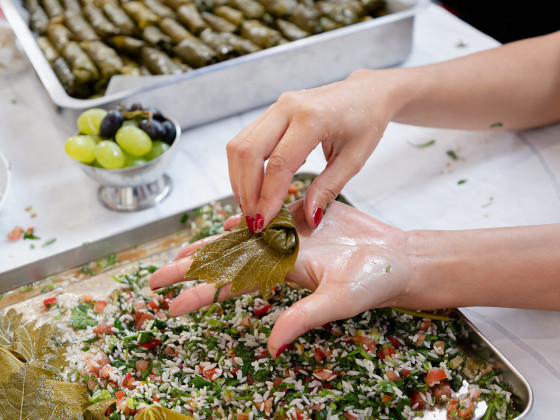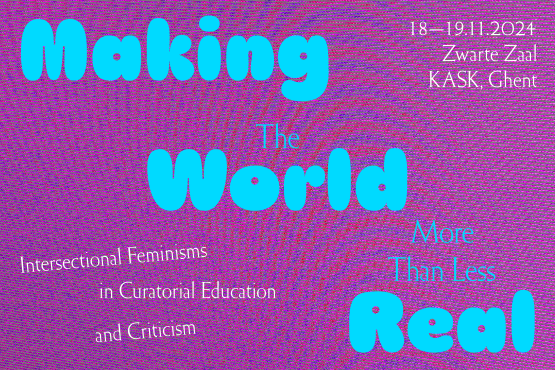
Making the World More Than Less Real: Intersectional Feminisms in Curatorial Education and Criticism.
A two-day assembly of lectures, workshops and screenings
18–19.11.2024, 10:00–20:30
Zwarte Zaal
Feminist education – the feminist classroom – is and should be a place where there is a sense of struggle, where there is visible acknowledgment of the union of theory and practice, where we work together as teachers and students to overcome the estrangement and alienation that have become so much the norm in the contemporary university. Most importantly, feminist pedagogy should engage students in a learning process that makes the world “more than less real.”
bell hooks, Teaching Community: A Pedagogy of Hope
Making the World More Than Less Real
Intersectional Feminisms in Curatorial Education and Criticism
A two-day assembly featuring lectures, workshops, and screenings.
Speakers: Marwa Arsanios, Rebecca Jane Arthur, Barbara Debeuckelaere, Annie Jael Kwan, Autocoscienza Writing Group (Alessia Arcuri, Lucia Farinati, Sara Paiola, and Sara Ortolani), Laura Huertas Millán, Nuraini Juliastuti, Benny Nemer, Laura Palau, Nataša Petrešin-Bachelez, Matylda Taszycka (AWARE), Lola Olufemi, and more.
Curatorial team: Sonia D'Alto, Jana J. Haeckel, Laura Herman, Isabel Van Bos
in collaboration with the Archival Sensations Research Cluster
Making the World More Than Less Real brings voices from diverse cultural contexts to enter in dialogue about how we can weave intersectional feminist perspectives into the fabric of curatorial education, in step with an ever-shifting cultural landscape.
Location
Zwarte Zaal, Royal Academy of Fine Arts (KASK), School of Arts of University College Ghent, Louis Pasteurlaan 2, 9000 Ghent, Belgium
Kunsthal Gent, Lange Steenstraat 14, 9000 Ghent
schoolofartsgent.be
curatorialstudies.be
Full programme booklet here.
Lectures will be livestreamed via Zoom, with automated live captions provided by the platform. Presentations will be designed to be high-contrast and easy to view.
Register here to attend lectures online on day 1.
Register here to attend lectures online on day 2.
About
The convergence of feminism and curatorial practice is rooted in a history sparked by the exclusion of women artists from exhibitions, collections, and art education. Over time, this movement has grown, embracing a spectrum of feminist perspectives that build and unravel archives, challenge narratives, create new ways of seeing and interpretative frameworks, and expose structural inequalities within the art world. In recent years, curating has increasingly explored evolving notions of citizenship, politics, and public participation, particularly in the context of social justice and activism. This shift has been informed by a wide range of feminist viewpoints, including Black feminism, decolonial feminism, ecofeminism, hydrofeminism, crip feminism, and transfeminism. These theories have introduced crucial tools and concepts such as care, intersectionality, and situatedness, offering a critical examination of power dynamics and revealing the intertwined layers of domination and marginalisation. Today, intersectional feminist thought drives movements toward equality, freedom, and care, questioning rigid gender lines and reshaping how we understand power. This spirit of transformation flows through the art world, influencing curatorial practice. Yet, while artistic innovation often guides curatorial shifts, it doesn't always reach the deeper layers of educational methods.
With this in mind, Curatorial Studies asks: How do we weave intersectional feminist perspectives into the fabric of curatorial education, in step with an ever-shifting cultural landscape? Feminist pedagogy, grounded in feminist and critical theory, emphasises shared power in learning environments. It recognises that knowledge is socially produced through collaboration and addresses power dynamics within the classroom. It asks us to see traditional structures anew, through a feminist lens, and create spaces where marginalised voices resonate and rise. Here, participants don’t just absorb the programme’s content—they shape it—urging us to face the uneven terrain of knowledge itself. What if we turn towards curation that feels, that embraces the body, experience, and fluidity—an interdisciplinary and affective practice? And what of the connections between (un)learning, care, and the labour of parenthood? These, too, ask for our attention. As bell hooks reminds us in Teaching Community: A Pedagogy of Hope, education should reach beyond theory, engaging with real-world complexities, advocating for education that goes beyond theory to address lived realities.
The conference will include panel presentations, keynote speakers, breakout sessions, and open discussions centred on pivotal questions: How can intersectional feminist curating inform pedagogical strategies in curatorial education? How can we hold space to teach concepts of care, situatedness, collective action, and responsibility in curatorial practice? Additionally, we will explore the current landscape of intersectional feminist art criticism and writing, focusing not just on representing female artists or critiquing art history, but on the practice of feminist writing as a form of wor(l)d-building.
The four breakout sessions will invite students, curators, artists, researchers, and the wider public into intimate, closed workshops, each aligned with the key themes and presentations of the conference. These sessions will serve as spaces for reflection on feminist strategies, exploring new pedagogical approaches and working together to craft a Code of Practice—a set of actionable ideas to reshape structures and curricula in art schools and cultural institutions. Each group will be guided by KASK researchers—Barbara Debeuckelaere, Benny Nemer, Laura Palau, and Rebecca Jane Arthur—who will share their research, steer discussions, and support the collaborative development of this transformative code.
Programme
Monday, 18 November 2024
10:00
Doors open
Coffee, tea, and cake
Location: Zwarte Zaal
10:30
Welcome and introduction
by Sonia D’Alto, Jana J. Haeckel and Laura Herman
Location: Zwarte Zaal
10:45
On Feminist Refusal
Opening lecture by Lola Olufemi
Location: Zwarte Zaal
This intervention will use a range of feminist pedagogical experiments to pose two questions: What is the feminist refusal? How can and should it make us think about the world differently?
11:30
Introduction to User’s Manual
By Danielle van Zuijlen (Kunsthal Gent)
Location: Zwarte Zaal
11:45
Scrittura di esperienza (Part 1)
Writing Workshop by Autocoscienza Writing Group (Alessia Arcuri, Lucia Farinati, Sara Paiola, and Sara Ortolani)
Location: Zwarte Zaal & other locations
What is the role of co-narration in feminist practices of consciousness raising? In what way is it possible to develop new feminist practices through writing? What differences do exist between autobiographical writing and embodied affective writing? Scrittura di esperienza (experiential writing) is a feminist methodology and a political practice developed by Lea Melandri in the early 1990s, as a continuation and reappraisal of Italian feminist practices of autocoscienza (consciousness raising) of the 1970s including the practice of the unconscious (la practica dell’inconscio). Melandri has been one of the first supporters of teaching for housewives through the Italian State funded ‘150-hour courses’ – a key turning point in feminist education which has led to the establishment of the Free Women’s University in Milan in 1987. This workshop provides insight into Melandri’s methodology and her long-standing career as a writer, educator, and feminist activist. Each participant will have the opportunity to reflect on their own writing through practical exercises. The workshop is open to everyone, 13:0013:00 and it is particularly relevant to those working in the context of pedagogy and research, therapy, violence and abuse prevention, or on self-organised initiatives concerned with feminism and writing.
13:15
Lunch Break
Location: KASKcafé
14:15
Scrittura di esperienza (Part 2)
Writing Workshop by Autocoscienza Writing Group (Alessia Arcuri, Lucia Farinati, Sara Paiola, and Sara Ortolani)
Location: Zwarte Zaal
16:45
Breakout Rooms (Part 1)
Queering as a Pedagogical Mode
by Benny Nemer
Location: Kunstenbibliotheek
“Queering” techniques are increasingly being invoked in cultural and pedagogical contexts with the aim of destabilising normative and disciplinary modes of exhibition curation, spectatorship, and education. What is queering, and how might it be mobilised as a pedagogical method at the service of more embodied, inclusive, and polyphonic Benny Nemer, documentation of I DON'T KNOW WHERE PARADISE IS, guided tour of a library, Playfair Library, Edinburgh, 2019. modes of learning? We will use the Kunstenbibliotheek — KASK & Conservatorium’s art library — as a case study and a site of inquiry. Together we will review the ways the library organises and transmits knowledge and imagine and experiment with queer ways to navigate, order, and encounter its holdings.
Glasshouse and Soft Stones: Grafting Ecofeminist Strategies into Artistic and Educational Practices
by Laura Palau
Location: Pear tree, Bijloke campus
In an era of ecological crisis, the need to rethink how artistic and educational practices connect with the more-than- human world has never been more pressing. As the natural world increasingly reshapes our cosmologies, how do we find our place within its spectrum? This workshop explores grafting and pruning as creative and pedagogical tools, engaging with the apple trees at Bijloke to reflect on their past and envision their future. Inspired by Donna Haraway’s notion that “It matters what ideas we use to think other ideas (with),” this session shifts away from extractive, capitalist models of art production toward sustainable practices that honour the teachings of fruit trees. By immersing ourselves in the rhythms and cycles of the trees, we will experience and co-design exercises that help us attune to the natural world, fostering a dual process of learning and unlearning: opening up to the vibrations and interconnectedness of life, intuition, and ancestral wisdom, while simultaneously letting go of human-centered, colonial and patriarchal patterns of thought and behavior.
The Dinner Party Extended
by Rebecca Jane Arthur
Location: Cirque
Imagining a fertile, feminist future, one must learn from the past, one’s own, and those who’ve ‘paved the way’, as Sara Ahmed put it in her book Living a Feminist Life (2017). Within this workshop, ‘The Dinner Party Extended’, we’ll dive into the symposium theme ‘Archival and Historical Positions and Missing Narratives’ together and build on our collective feminist memory, inspired by Judy Chicago’s seminal work ‘The Dinner Party’ (1979). I will discuss my artistic research project Homeward Bound —Her Memoir on Binds and Becoming which, through a feminist lens, aims to out the systems/structures that shape women’s lives (class, economy, education, patriarchy, heteronormativity, family, racism, culture, religion, etc.) with the intent to transform and build anew, in parallel to celebrating works of art by women that show manifestations of revolt and defense through reflection and creation, processing the binds that constrain oneself by turning the inside out. Asserting the pedagogical position to highlight missing narratives of women’s art in our art history books, we’ll look at Chicago’s work, in which she creates 39 table settings for remarkable yet under-celebrated women in history, and then we will all select a ‘dinner party guest’— a woman/non-binary artist of your choice – to invite to our roundtable conversation. Who would you invite to dinner?
Collaborative Disruptive Practices
by Barbara Debeuckelaere
Location: CS Seminar room
Historically, art curricula, like many educational frameworks, have privileged Western, Eurocentric narratives while marginalising or erasing other ways of knowing, creating, and being. How can art education foster critical consciousness and activism? How can we create spaces that challenge colonial assumptions and invite more inclusive, intersectional ways of thinking and creating? What does it look like for artists and curators to engage in collaborative, community-based practices that disrupt traditional power structures? In this workshop, I will give the key points from ‘the classroom as a radical space of possibility/bell hooks’, a research we conducted at KASK Photography department but mostly we focus on collaborative art projects, like our project ‘Om/Mother (Hebron, Palestine), that aim to challenge traditional ideas of authorship and the artist-audience relationship, and emphasise collective creativity and shared storytelling. How can curators and artists ensure that they are representing communities in an ethical way. What are the challenges of working with marginalised groups, and how can we avoid exploitation or tokenisation? How do curators and artists balance aesthetic concerns with the practical or political aspects of their projects? How can participatory art projects ensure that they benefit the communities involved rather than just the artist or institution? We will map together a hypothetical participatory art project that involves collaboration with a community of choice, considering practical concerns like ethics, representation, and presentation.
19:30 – 20:15
Film Screening: Adriana Monti, Scuola Senza Fine (School Without End), 1983 (37 min)
Introduced by Sonia D’Alto
Location: KASKCinema
A group of women following the worker-union-sponsored “150 hours” course to complete their secondary school education are mentored by feminist, activist, and writer Lea Melandri. Adriana Monti follows the women as they reconsider their role as housewives and the effects of this type of political education on their self-narration.
Tuesday, 19 November 2024
10:00
Doors open
Coffee, tea, and cake
Location: Zwarte Zaal
10:30
Welcome and introduction
by Sonia D’Alto, Jana J. Haeckel and Laura Herman
Location: Zwarte Zaal
10:45
Curating with the perspective of transnational and intergenerational feminisms
Opening Lecture by Nataša Petrešin-Bachelez
Location: Zwarte Zaal
Starting with a central video work from an exhibition about transnational feminisms that we curated with Wim Waelput for Kiosk, at KASK, in 2017, I will show how this work, a document about a Forum taking place alongside the World Conference on Women in Nairobi in 1985, has contributed to my interest feminist infrastructures practices, politics and processes. In a self-reflexive way, I will try to show how feminist curatorial practices can contribute to transforming existing (infra)structures into spaces for interdependent and transnational thinking, acting, organising and caring through relations and responsibilities to the communities that they maintain and belong to.
Excerpt of Screening of FRANÇOISE DASQUES, La conférence des femmes - Nairobi 85, 60’, 1985
After Mexico 75 and Copenhagen 80, the United Nations choose the Dark Continent for the Third International Women’s Conference. Running in parallel to the official Governments Conference, is the Non Governmental Organizations Forum attended by 14 000 women. For 10 days, they meet on the University Campus to discuss feminist and general political issues: peace, development, Apart, Islam, lesbianism, violence and sexual mutilation, Israel/Palestine...
12:00
The Roundhouse in the Cassava Garden
Lecture by Nuraini Juliastuti
Location: Zwarte Zaal
A lecture and storytelling session about the architecture of curatorial practices which stand on the constant reimagining of alternative publishing strategies, archiving, and motherhood. In these acts of reimagining, how to deal with the abundant, leakage and escapes and knowledge? What kinds of ‘becomings’ and tactile strategies that might emerge from the impossibilities and possibilities of translating the futures?
13:00
Lunch
Location: KASKcafé
14:15
Breakout Rooms (Part 2)
Queering as a Pedagogical Mode
by Benny Nemer
Location:Kunstenbibliotheek
Glasshouse and Soft Stones: Grafting Ecofeminist Strategies
into Artistic and Educational Practices.
by Laura Palau
Location: Pear Tree, Bijloke
The Dinner Party Extended
by Rebecca Jane Arthur
Location: Cirque
Collaborative Disruptive Practices
by Barbara Debeuckelaere
Location: CS Seminar room
15:30
Break
15:40
On Women’s Access to Art Education
Introduction by Matylda Taszycka (AWARE: Archives of Women Artists, Research, Exhibitions)
Location: Zwarte Zaal
After providing a brief historical overview of women's access to art education, this intervention will focus on the commitments of AWARE: Archives of Women Artists, Research & Exhibition, a feminist non-governmental organisation based in Paris: its long-term interest in feminist pedagogies, research and implementation of innovative working methods and programmes.
16:00
Transmission Experiments
Lecture Performance by Laura Huertas Millán + Q&A
Location: Zwarte Zaal
As an art student, educator, and professional artist navigating Global North institutions, I’ve observed that diasporic and gendered artists often face distinct forms of hostility. These artists are frequently pressured to suppress personal interests, homogenize their work, and expose their contradictions, all while being categorized into “othering” identity boxes that can offer only fleeting recognition. Through my personal experiences, I’ve seen how these challenges force artists to develop pedagogical strategies, asking them to become both creators and mediators of their own work. In classrooms, I’ve also noticed how essential real-world study cases are for shaping the next generation of art workers. Drawing from feminist approaches to subjectivity building, this lecture performance offers my personal reflection on navigating some of these contradictions, as well as strategies that have emerged from this experience. Modeled after a DVD bonus director’s commentary, the format emphasises oral transmission, using the structure of a single film to guide the flow and timing of the presentation. By merging the personal with the pedagogical, this performance seeks to share practical tools for diasporic and gendered artists, and for anyone interested in engaging with such creative practices.
17:00
Break
17:30
Who is Afraid of Ideology?
Lecture by Marwa Arsanios + Q&A
Location: Zwarte Zaal
Marwa Arsanios will talk about different stages of her long term project Who is Afraid of Ideology? focusing on processes and methodologies of collective work. She will go through the different strategies of land communalisation that she has worked with and encountered throughout the way and the role and place of film within those processes.
18:00
Decompression/Breathing
Location: Zwarte Zaal
18:10
Presentation of Code of Practice
By Curatorial Studies participants, based on breakout rooms
Location: Cirque
18:40
Practicing permutations: coding for possible future/s
by Annie Jael Kwan
Location: Cirque
19:15
Closing Drinks
Location: KASKcafé
Practical information
Register here.
Entry is free, but you can also donate to Mophradat's "Living Stipends for Palestine" programme, which offers six-month grants to Palestinian professional artists impacted by the current crisis.
A note on accessibility
We are committed to creating an inclusive and accessible programme that allows all individuals, including those with disabilities, to fully engage.
Lectures will be livestreamed via Zoom, with automated live captions provided by the platform. Presentations will be designed to be high-contrast and easy to view.
Register here to attend lectures online on day 1.
Register here to attend lectures online on day 2.
The programme will include short breaks, and you are encouraged to take additional breaks as needed.
Accessible restrooms are available on the ground floor.
We are unable to provide sign language interpretation at this time, but we hope to offer this in the future.
If you have a disability and require specific accommodations to fully participate, please reach out to us at curatorialstudies@hogent.be, and we will do our best to meet your needs.
Organisation
The assembly is an initiative of Curatorial Studies, a postgraduate programme organized organised by KASK & Conservatorium (HOGENT - Howest), Ghent University, S.M.A.K. – the contemporary art museum in Ghent, and Kunsthal Gent. The event is supported by the Archival Sensations Research Cluster at KASK & Conservatorium, AWARE Archives of Women Artists, Research and Exhibitions, with support from the French Embassy in Belgium and the Institut français, as part of EXTRA, a programme that supports French contemporary creation in Belgium.

